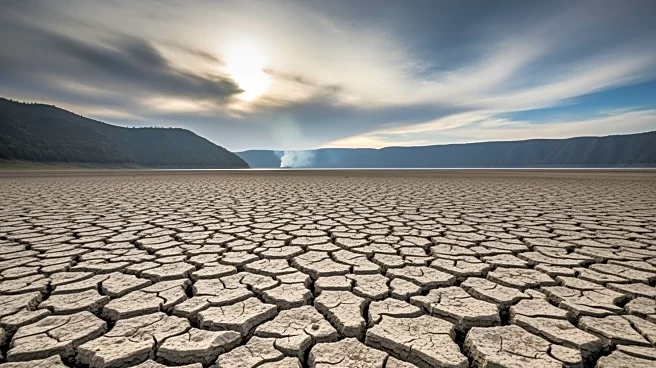What's Happening?
Recent research has highlighted the seismic risks associated with drying rift lakes, particularly focusing on Lake Turkana in Kenya. As the lake's water levels have decreased over millennia due to a drying climate,
seismic activity has increased, leading to more frequent earthquakes and volcanic eruptions. This phenomenon is attributed to reduced pressure on the lakebed, which facilitates tectonic movements and magma flow. The study, conducted by Christopher Scholz and colleagues, utilized sediment analysis and sonar imaging to assess fault movements and volcanic activity. The findings suggest that similar risks could affect other global water bodies as climate patterns shift.
Why It's Important?
The implications of this study are significant for understanding the broader impact of climate change on geological activity. As water levels in lakes and other bodies decrease, the potential for increased seismic activity poses risks to nearby communities and infrastructure. This research underscores the need for integrating climate considerations into seismic hazard assessments and planning. Governments and policymakers may need to reconsider the placement and removal of dams and other water management structures to mitigate earthquake risks. The study also highlights the interconnectedness of climate change and geological processes, emphasizing the importance of comprehensive environmental monitoring.
What's Next?
Future research may focus on expanding the study to other rift lakes and regions to better understand the global implications of these findings. Additionally, there may be increased advocacy for the installation of seismometers in vulnerable areas to monitor changes in seismic activity. Policymakers could be prompted to incorporate these findings into environmental and infrastructure planning, potentially leading to new regulations or guidelines for managing water resources in seismically active regions.
Beyond the Headlines
The study raises ethical considerations regarding the impact of human activity on natural systems. As climate change continues to alter environmental conditions, the responsibility to mitigate its effects becomes increasingly urgent. This research may also influence cultural perceptions of climate change, highlighting the need for global cooperation in addressing environmental challenges.









